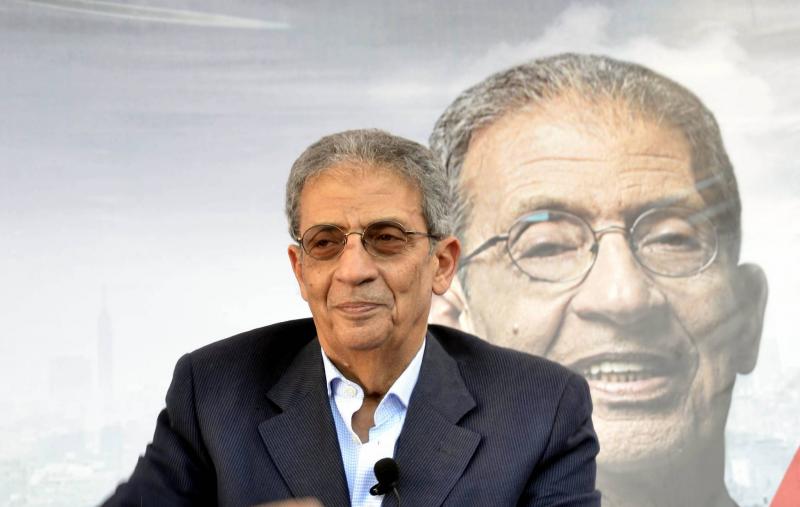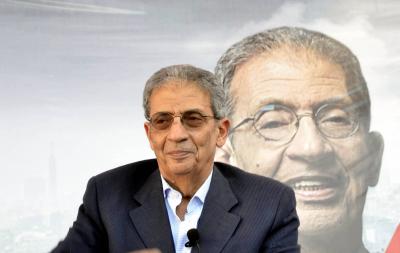In an interview with the seasoned diplomat Amr Moussa, insights are revealed that illuminate a still-living history. Moussa has been a maker and witness of Arab political developments for decades, having led Egyptian diplomacy from 1991 to 2001 and served as Secretary-General of the Arab League from 2001 to 2011 during a turbulent decade. In this dialogue with "Asharq Al-Awsat," Moussa reflects two decades after the U.S. invasion of Iraq (2003), describing it as a pivotal event whose wounds "have not yet healed." He contemplates the path that led to the invasion and the fractures it caused in the Arab structure.
Moussa starts his reflection on the American invasion of Iraq by referencing an earlier invasion he sees as essential to understanding the unfolding events—the Iraqi invasion of Kuwait (1990-1991). He notes that it "revealed the true nature of Saddam Hussein's expansionist project, disrupted the Arab system notably, and created skepticism even among countries that Saddam was trying to rally for support, particularly Egypt." Moussa believes that the Arab and international coalition formed to liberate Kuwait "established a new reality regarding the region's security and curtailed Saddam's ambitions," which he asserts "would not have stopped at Kuwait; Syria was the next station on his expansionist agenda for reasons related to dominance over the Ba'ath movement."
Deep Transformations
Moussa reflects on some changes that occurred between the Kuwaiti invasion and the American invasion of Iraq, noting that the events of September 11, 2001, played a significant role in those transformations. He states, "the Iraqi regime at the time did not manage to read the situation correctly," emphasizing that it "changed the course of U.S. policy and pushed the United States to resort to force."
Regarding the Arab awareness of the dangers prior to the U.S. invasion, Moussa comments, "there was clear information available to Arab decision-makers, some of which was made public, indicating that the United States was preparing for the invasion and that Iraqi opposition leaders were coordinating with them. Arab intelligence services were active in this direction." He adds, "In my view, Saddam Hussein at that time became complacent, thinking that Washington would not carry out its military intervention, which is strange and a grave risk for the fate of the Iraqi people and its ancient state." He notes that most Arab leaders either did not care about Saddam's fate or believed he deserved what was about to happen to him.
Gates of Hell
Reflecting on the role he played as Secretary-General of the Arab League in the "race against time" to avoid the U.S. invasion, which he believed had "already been decided in Washington," Moussa explains that he acted based on the League’s role in defending the comprehensive Arab interests. His first step was to issue a public warning about the gravity of the situation, where he famously remarked that "the invasion of Iraq would open the gates of hell."
His second move occurred 14 months before the invasion when he met with Iraqi President Saddam Hussein in January 2002, confirming that Iraq did not possess weapons of mass destruction or nuclear reactors, and emphasized the need to resume inspections to avert any attack on Iraq. Saddam responded, "O Brother Amr, I trust your nationalism and Arabism, and you will not conspire against Iraq." Moussa recounts informing Saddam that he would convey this message regarding Iraq’s weapons status to the UN Secretary-General at the time, Kofi Annan, and Saddam approvingly said, "You are authorized to speak on behalf of Iraq."
The third course of action involved conducting a series of Arab and international consultations to save the situation in the fall of 2002, at a time when the U.S. was working towards shaping global public opinion for war. He confirms, "We succeeded in that effort in pushing back the danger, but not in eliminating it."
Discussing the atmosphere within the Arab League during the invasion on March 19-20, 2003, Moussa mentions that a council session was continuously held at his request. On the day of the invasion, they followed the news with mixed feelings; while reports of resistance excited attendees, comments from the Iraqi information minister, Mohammed Saeed Al-Sahaf, evoked laughter, but they all felt that the situation would lead to one outcome, which materialized two weeks later with the fall of Baghdad.
The shared tragedy of the 1967 setback was recalled when discussing the U.S. invasion of Iraq. Moussa asserts that the commonality lies in political miscalculations. The misjudgment in 1967 was corrected through thorough preparation for the October 1973 war, whereas the political miscalculation regarding Saddam Hussein persisted.
American Soldiers and Iraq's Fate
Moussa elaborated on the "utter chaos" that ensued in Iraq post-invasion, expressing his conviction that there was a plot to "kidnap Iraq." He asserts, "It is certain to me that the attempt to capture Iraq and extract its Arab identity was forcefully and decisively executed from within Iraq by some of its political factions, alongside the influence of Iraq's neighbors, namely Iran, resulting in an Iraq unlike the one we knew. Facilitating Iran's access to Iraq was a significant strategic error."
He notes, "The identity was the first thing Iraqis collided with after the invasion." He further recounts that the Arab League played a crucial role in uniting all components of Iraq for the first time. In this context, he reminisces about his personal intervention to maintain the Arab identity in the Iraqi constitution being discussed at that time and his success in coordinating with the "new Iraqi leaders" across various political and sectarian affiliations to "preserve the Arab face of Iraq." He acknowledges that "they all recognized this Arab belonging and saw that it was against their interest to deny or erase it."
When asked if the "wounds of the American invasion" have healed after 20 years, Amr Moussa unequivocally replies, "Certainly... No." He adds, "Iraq has faced the destruction of its institutions and the fragmentation of its components, and rebuilding will take time." He contends, "Today, Iraq is on a clear path, and there is a genuine desire for reform. A key pillar of this reform lies in considering itself a part of the Arab world."
Moussa advocates for presenting a new vision for Arab nationalism that aligns with the 21st-century transformations, based on shared interests. He states, "What I observe is that we have awakened, that sentiments and slogans inciting the streets have become a thing of the past, and the future should be built on pillars such as shared interests, improving the conditions of the Arab citizen, and good governance." He emphasizes that "the absence of good governance has rendered the Arab world a fertile ground for the creation of constructive chaos."
Regarding whether the Iraq invasion could be repeated regionally in light of the current tensions between the West and Iran, the former secretary-general states that "political miscalculations lead to the same results; it is unimaginable for someone to repeat the same mistakes and expect positive outcomes."
He elaborates, "Iran is currently under the microscope, with demands from the Israeli government and some factions moving in a similar direction to strike Iran." He expresses his belief that the lessons from the U.S. invasion of Iraq "remain relevant to everyone," emphasizing the necessity for "any ruler or state not to overestimate its strength and to avoid arrogance; playing with the big powers is dangerous, and in critical moments, only widespread acceptance within your country and the region will protect you."
Regarding the regional and international scene twenty years after the U.S. invasion of Iraq, he states, "a new Cold War is coming. A Western-Russian war, another American-Chinese war, and various conflicts." He continues, "Arab countries today are politically weak on the global scale, and we must be part of a larger global movement, namely the Global South, where we will find states like India, Brazil, and others beside us on this path." He notes that "these groupings are still in the process of maturation."




